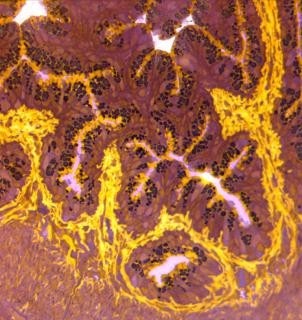
Research in the Department of Biology covers a wide range of topics, including ecology, evolution, and organismal and molecular biology. The disciplines in which faculty within Biology have active research programs are listed below. Students from all academic levels (B.Sc., M.Sc. and Ph.D.) are integrally involved in our research projects. To join any laboratory, please contact faculty members directly. You can also find more information on these other pages:
Evolution
- Evolution of a symbiosis between unicellular green algae and salamander egg masses (C. Bishop)
- Seaweed evolution and life histories. (D. Garbary)
- Insect evolution, sexual selection and mating system evolution (J. Perry)
- Experimental evolution (J. Perry)
- Social evolution theory; applications to agriculture and plant breeding (J. Biernaskie)
Biogeography
- North Atlantic seaweed and invertebrate biogeography. (D. Garbary, R. Scrosati)
- Latitudinal variation of green algal symbiont diversity associated with amphibian egg masses. (C. Bishop)
- Insect distributions across the Maritimes (J. Perry)
- 3-domain amplicon sequencing of whole seawater samples to profile global biogeography of marine plankton (J. McNichol)
Marine Ecology
- Seaweed and eelgrass ecology, including symbiosis. Invasive algae. (D. Garbary)
- Ecology of rocky intertidal invertebrates and macroalgae. Marine biodiversity. (R. Scrosati)
- Biofouling and low-toxicity antifouling. (R. Wyeth)
- Foraging biology of the lobster. (R. Wyeth)
Freshwater Ecology
- Ecosystem structure and energy flow in streams and rivers. (B. Taylor)
- Ecological restoration. (B. Taylor)
- Freshwater benthic invertebrates (B. Taylor)
- Semi-aquatic insects (J. Perry)
Animal Biology
- Breeding and migration ecology of owls. (R.F. Lauff)
- Carrion beetles and predaceous aquatic insects. (R.F. Lauff)
- Biology of intertidal invertebrates. (R. Scrosati)
- Invertebrate neuroethology, behaviour, and neurobiology. Odour-based navigational strategies. (R. Wyeth)
- Environmental physiology of aquatic vertebrates (T. Rodela)
- Physiology of how insects survive freezing and extreme low temperatures. (J. Toxopeus)
- Insect behaviour and life history (J. Perry)
Plant Biology
- Biology of marine macroalgae. (D. Garbary, R. Scrosati, M.Galway)
- Ecology of rare floodplain plants. (B. Taylor)
- investigating the mechanism of the plant-growth enhancing effects of frass, a low-carbon byproduct of industrial insect farming (C. Bishop)
- Ecology and physiology of wheat crops (J. Biernaskie)
Microbiology
- The involvement of bacteria in an algal symbiosis between salamander egg masses. (C. Bishop)
- Isolation, cultivation, and genomic characterization of sulfur-oxidizing chemolithoautotrophs from deep-sea hydrothermal vents and coastal marine sediments (J. McNichol)
Cell Biology
- Cellular differentiation in plants including marine macroalgae. (M. Galway)
- Neurophysiology of circuits controlling navigation behaviour. (R. Wyeth)
- Characterizing how insect cell structure and function changes at extreme low temperatures (J. Toxopeus)
Molecular Biology
- Genome sequencing, assembly and annotation. Amplicon sequence analysis. (C. Bishop)
- Studying and manipulating gene expression (e.g. via RNAi) in freeze-tolerant insects (J. Toxopeus)
- Uncovering genes related to sexual traits (J. Perry)
- Using sequence data to map variation in plant traits to the genome (J. Biernaskie)
Contact
208 J. Bruce Brown Hall
2320 Notre Dame Avenue
Antigonish NS B2G 2W5
Canada

